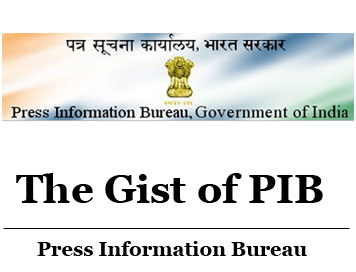NEW! The Gist (APR-24) | E-BOOKS |
(THE GIST OF PIB) Zonal Council

(THE GIST OF PIB) Zonal Council
(June-2023)
Zonal Council
- The 13th meeting of the Standing Committee of the Eastern Zonal Council was recently concluded in Patna.
About
- The idea of creation of Zonal Councils was mooted by the first Prime Minister of India, Pandit Jawahar Lal Nehru in 1956.
- He suggested that the States proposed to be reorganised may be grouped into four or five zones having an Advisory Council “to develop the habit of cooperative working” among these States.
- This suggestion was made by Pandit Nehru at a time when linguistic hostilities and bitterness as a result of re-organisation of the States on linguistic patterns were threatening the very fabric of our nation.
- As an antidote to this situation, it was suggested that a high level advisory forum should be set up to minimise the impact of these hostilities and to create healthy inter-State and Centre-State environment with a view to solving inter-State problems and fostering balanced socio economic development of the respective zones.
Composition of Zonal Councils
- In the light of the vision of Pandit Nehru, five Zonal Councils were set up vide Part-III of the States Re-organisation Act, 1956. The present composition of each of these Zonal Councils is as under:
- The Northern Zonal Council, comprising the States of Haryana, Himachal Pradesh, Jammu & Kashmir, Punjab, Rajasthan, National Capital Territory of Delhi and Union Territory of Chandigarh;
- The Central Zonal Council, comprising the States of Chhattisgarh, Uttarakhand, Uttar Pradesh and Madhya Pradesh;
- The Eastern Zonal Council, comprising the States of Bihar, Jharkhand, Orissa, Sikkim and West Bengal;
- The Western Zonal Council, comprising the States of Goa, Gujarat, Maharashtra and the Union Territories of Daman & Diu and Dadra & Nagar Haveli;
- The Southern Zonal Council, comprising the States of Andhra Pradesh, Karnataka, Kerala, Tamil Nadu and the Union Territory of Puducherry.
- The North Eastern States i.e. (i) Assam (ii) Arunachal Pradesh (iii) Manipur (iv) Tripura (v) Mizoram (vi) Meghalaya and (vii) Nagaland are not included in the Zonal Councils and their special problems are looked after by the North Eastern Council, set up under the North Eastern Council Act, 1972.
- The State of Sikkim has also been included in the North Eastern Council vide North Eastern Council (Amendment) Act, 2002. Consequently, action for exclusion of Sikkim as a member of Eastern Zonal Council has been initiated by the Ministry of Home Affairs.
Organisational Structure of Zonal Councils
- Chairman – The Union Home Minister is the Chairman of each of these Councils.
- Vice Chairman – The Chief Ministers of the States included in each zone act as Vice-Chairman of the Zonal Council for that zone by rotation, each holding office for a period of one year at a time.
- Members – Chief Minister and two other Ministers as nominated by the Governor from each of the States and two members from Union Territories included in the zone.
- Union Ministers are also invited to participate in the meetings of Zonal Councils depending upon necessity.
Role & Objective of the Zonal Councils
- The Zonal Councils provide an excellent forum where irritants between Centre and States and amongst States can be resolved through free and frank discussions and consultations.
- Being advisory bodies, there is full scope for free and frank exchange of views in their meetings.
- Zonal Councils are regional fora of cooperative endeavour for States linked with each other economically, politically and culturally. Being compact high level bodies, specially meant for looking after the interests of respective zones, they are capable of focusing attention on specific issues taking into account regional factors, while keeping the national perspective in view.
- The main objectives of setting up of Zonal Councils are as under :
- Bringing out national integration;
- Arresting the growth of acute State consciousness, regionalism, linguism and particularistic tendencies;
- Enabling the Centre and the States to co-operate and exchange ideas and experiences;
- Establishing a climate of co-operation amongst the States for successful and speedy execution of development projects.
Functions of the Councils
- A Zonal Council may discuss, and make recommendations with regard to:
- any matter of common interest in the field of economic and social planning;
- any matter concerning border disputes, linguistic minorities or inter-State transport;
- any matter connected with or arising out of, the re-organization of the States under the States Reorganisation Act.
CLICK HERE TO DOWNLOAD FULL PDF
CLICK HERE TO DOWNLOAD UPSC E-BOOKS
Study Material for UPSC General Studies Pre Cum Mains
Get The Gist 1 Year Subscription Online
Click Here to Download More Free Sample Material
<<Go Back To Main Page
Courtesy: PIB


